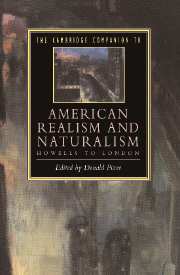Book contents
- Frontmatter
- Introduction
- PART ONE HISTORICAL CONTEXTS
- PART TWO CONTEMPORARY CRITICAL ISSUES
- PART THREE CASE STUDIES
- 5 The Portrait of a Lady and The Rise of Silas Lapham
- 6 The Realism of Adventures of Huckleberry Finn
- 7 The Red Badge of Courage and McTeague
- 8 What More Can Carrie Want? Naturalistic Ways of Consuming Women
- 9 The Awakening and The House of Mirth
- 10 The Call of the Wild and The Jungle
- 11 Troubled Black Humanity in The Souls of Black Folk
- Further Reading Index
- Index
11 - Troubled Black Humanity in The Souls of Black Folk
from PART THREE - CASE STUDIES
Published online by Cambridge University Press: 28 May 2006
- Frontmatter
- Introduction
- PART ONE HISTORICAL CONTEXTS
- PART TWO CONTEMPORARY CRITICAL ISSUES
- PART THREE CASE STUDIES
- 5 The Portrait of a Lady and The Rise of Silas Lapham
- 6 The Realism of Adventures of Huckleberry Finn
- 7 The Red Badge of Courage and McTeague
- 8 What More Can Carrie Want? Naturalistic Ways of Consuming Women
- 9 The Awakening and The House of Mirth
- 10 The Call of the Wild and The Jungle
- 11 Troubled Black Humanity in The Souls of Black Folk
- Further Reading Index
- Index
Summary
'Once I thought my grandfather incapable of thoughts about humanity, but I was wrong. Why should an old slave use such a phrase as, “This and this or this has made me more human,” as I did in my arena speech? Hell, he never had any doubts about his humanity - that was left to his “free” offspring. He accepted his humanity.' (Ralph Ellison, Invisible Man) These ruminations by the protagonist of Ralph Ellison's Invisible Man are paradoxical. Chattel slavery in the United States was a system calculated to impress on black and white alike the inferiority and brutishness of black people, and yet in the memory of Ellison's narrator, his enslaved grandfather could emerge as more human than a young, intelligent black man of the twentieth century. Certainly it is true that the horrors of slavery were not felt uniformly and unceasingly by the enslaved, and that black resistance to the physical and psychological dimensions of bondage was endemic. In the words of Lawrence Levine, “Slave music, slave religion, slave folk beliefs - the entire sacred world of the black slaves - created the necessary space between the slaves and their owners and were the means of preventing legal slavery from becoming spiritual slavery” (80). But however effectively blacks managed to nurture their sense of humanity while in bondage, it seems curious that these same people and their descendants would experience that humanity more tenuously under freedom than they had under slavery.
- Type
- Chapter
- Information
- The Cambridge Companion to American Realism and NaturalismFrom Howells to London, pp. 263 - 277Publisher: Cambridge University PressPrint publication year: 1995
- 8
- Cited by

